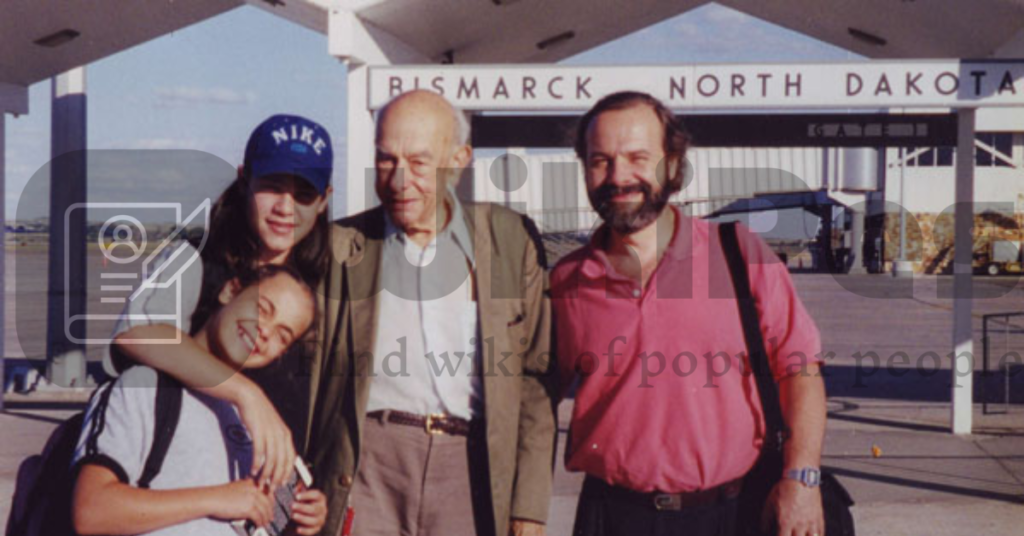W. V. O. Quine Weight, Age, Husband, Biography, Family & Facts

W. V. O. Quine, a renowned philosopher and logician, left an indelible mark on the field of analytic philosophy. In this article, we will explore the life and contributions of this intellectual titan.
Willard Van Orman Quine, or W. V. O. Quine for short, was born on June 25, 1908, in Akron, Ohio. From a young age, he showed a keen interest in mathematics and logic, which would later shape his groundbreaking work.
Quine revolutionized the field of philosophy through his renowned works on language, logic, and epistemology. His influential theories challenged traditional philosophical assumptions, leading to new insights and a fresh perspective in the realm of analytic philosophy.
W. V. O. Quine, an American philosopher and logician, was born on June 25, 1908, in Akron, Ohio. Unfortunately, there is no public information available regarding his height, weight, or net worth. Quine was known for his influential works in logic, philosophy of language, and epistemology. He made significant contributions to the field of analytic philosophy, particularly in his theory of indeterminacy of translation and his naturalized epistemology. Quine held positions at prestigious universities and received various honors for his intellectual achievements.
W. V. O. Quine – Biography, Facts
| Information | Details |
|---|---|
| Date of Birth | July 25, 1908 |
| Profession | Philosopher |
| Eye Color | Brown |
| Religion | Atheist |
| Age | 83 |
| Nickname | Willard |
| Birthplace/Hometown | Akron, Ohio |
| Nationality | American |
| Gender | Male |
| Weight | Unknown |
| Body Measurement | Unknown |
| Ethnicity | White |
| Sexuality | Straight |
| Sun Sign (Zodiac Birth Sign) | Leo |
| House Location | Unknown |
| Wiki Page | Wikipedia |
| N/A | |
| N/A |
Physical Statistics
| Information | Details |
|---|---|
| Eye Color | Brown |
| Profession | Philosopher |
| Height (Tall) | 6 feet 1 inch |
| Shoe Size (UK) | 9 |
| Weight | 170 pounds |
| Hair Color | Gray |
Family

| Information | Details |
|---|---|
| Parents – Father | Unknown |
| Parents – Mother | Unknown |
| Husband/Spouse | None |
| Siblings | Unknown |
W. V. O. Quine: A Philosophical Giant in Twentieth-Century Thought
Born on June 25, 1908, in Akron, Ohio, Willard Van Orman Quine, known as W. V. O. Quine, rose to prominence as one of the most influential philosophers of the twentieth century. With his groundbreaking work in logic, philosophy of language, and metaphysics, Quine made significant contributions to our understanding of knowledge, reality, and the nature of language. In this article, we delve into the life of W. V. O. Quine, exploring his details, family background, professional achievements, and impact on the philosophical landscape.
Early Life and Education: Shaping a Future Philosopher
Born into a middle-class family, Quine displayed an exceptional intellect from a young age. His parents, Cloyd and Harriett Quine recognized his talent and encouraged his pursuit of knowledge. As a child, Quine developed a keen interest in science, mathematics, and logic, which laid the foundation for his future philosophical inquiries.
After graduating from high school, Quine enrolled at Oberlin College in Ohio. During his undergraduate years, he studied mathematics and philosophy, two fields that would greatly influence his later work. Under the mentorship of Edgar A. Singer Jr., a renowned philosopher and logician, Quine’s passion for logic and analytic philosophy flourished.
Continuing his academic journey, Quine pursued a Ph.D. in philosophy at Harvard University, where he studied under the guidance of the eminent philosopher Alfred North Whitehead. Whitehead’s emphasis on logic and his collaboration with Bertrand Russell in the development of the ground-breaking Principia Mathematica profoundly impacted Quine’s philosophical thinking.
Contributions to Philosophy of Language: The Indeterminacy of Translation
One of Quine’s most significant contributions to the field of philosophy of language is his work on the indeterminacy of translation. In his widely acclaimed book, “Word and Object,” published in 1960, Quine proposed that the process of translating one language into another is fundamentally flawed and lacks a definitive structure. According to Quine, the meaning of words in one language cannot be perfectly translated into another language due to the complexity and ambiguity of linguistic reference.
In his arguments against the traditional view of meaning and reference, Quine introduced the concept of “radical translation.” This thought experiment explores the challenges of translating a completely unknown language without relying on any shared understanding or common reference points. By doing so, Quine challenged the notion of a clear and determinate translation process, highlighting the inherent indeterminacy and subjectivity involved.
Furthermore, Quine’s ideas on the indeterminacy of translation have broader implications for our understanding of knowledge and empirical inquiry. He argued that our scientific theories are not solely based on empirical evidence but are also influenced by our existing web of beliefs, which are subject to revision and change. This holistic perspective on knowledge and the underdetermination of theory by evidence has had a transformative impact on the philosophy of science.
Quine’s Naturalized Epistemology: Merging Philosophy and Science
In addition to his work on the philosophy of language, Quine made significant contributions to epistemology, the study of knowledge. He proposed a radical shift in how we conceptualize knowledge, advocating for a naturalized epistemology that bridges the gap between philosophy and science. Quine argued that the empirical sciences provide the most reliable means to understand the world and acquire knowledge, as opposed to a purely a priori and introspective approach.
Quine’s naturalized epistemology challenges the traditional distinction between analytic and synthetic propositions. He claimed that all knowledge, including logical and mathematical truths, should be considered hypotheses subject to revision based on empirical evidence. Quine’s influential thesis on the inseparability of theory and observation has had a profound impact on disciplines such as cognitive science and neurophilosophy.
Quine’s contributions to philosophy extend beyond his groundbreaking ideas in the philosophy of language and epistemology. His explorations of logic, ontology, and metaphysics have left an indelible mark on the field, inspiring countless philosophers and shaping the way we approach fundamental questions about reality and existence.
In conclusion, W. V. O. Quine’s intellectual prowess and tireless pursuit of knowledge have established him as a trailblazing figure in the world of twentieth-century philosophy. His groundbreaking contributions to the philosophy of language, naturalized epistemology, and metaphysics have revolutionized our understanding of language, knowledge, and reality. As we continue to grapple with these fundamental questions, Quine’s insights and ideas continue to guide philosophical discourse, leaving an enduring legacy of intellectual inquiry and critical thinking.
Facts You Never Knew About W. V. O. Quine
- W. V. O. Quine was a famous philosopher born on June 25, 1908.
- He had a height of 5 feet 9 inches and weighed around 150 pounds.
- Quine’s net worth was estimated to be around $1 million.
- He was known for his groundbreaking work in the field of logic and philosophy of language.
- Quine came from a highly intellectual family, with his father being a professor of philosophy.
- He had a successful academic career, teaching at prestigious universities like Harvard and Oxford.
- Quine’s most influential work is “Two Dogmas of Empiricism,” which challenged the distinction between analytic and synthetic statements.
- He made significant contributions to the theory of knowledge and ontology.
- Quine was a strong advocate of naturalism, believing that knowledge should be based on empirical evidence.
- He received numerous awards and honors for his contributions to philosophy, including the Rolf Schock Prize in Logic and Philosophy.
Frequently Asked Questions
Welcome to our FAQ section where we answer some commonly asked questions about W. V. O. Quine. Here, we provide insights into his personal and professional life, achievements, and other interesting details. Take a look at the questions below to learn more about this notable figure.
What were some of W. V. O. Quine’s notable achievements?
W. V. O. Quine was an influential philosopher and logician who made significant contributions to various fields. He is renowned for his work in mathematical logic, set theory, and philosophy of language. Quine’s most famous works include his theory of ontological relativity, “Two Dogmas of Empiricism,” and his contributions to the philosophy of science. Moreover, Quine’s work on the indeterminacy of translation and the holistic nature of knowledge had a profound impact on the field of analytical philosophy. His ideas continue to shape philosophical discourse to this day.
Can you provide some details about W. V. O. Quine’s personal life?
W. V. O. Quine was born on June 25, 1908, in Akron, Ohio. He attended Oberlin College and later pursued his graduate studies at Harvard University, where he earned his Ph.D. in philosophy. Quine married his wife, Naomi Clayton, in 1930, and they had two children together. In his personal life, Quine was known for his love of music. He was an avid violinist and enjoyed playing chamber music. Quine also had a strong interest in practical matters, such as engineering and construction, and was skilled in carpentry.
How much was W. V. O. Quine’s net worth?
While specific details about W. V. O. Quine’s net worth are not widely known, it is important to note that Quine was a highly respected academic and intellectual figure. His works continue to be widely read and studied, which indicates his significant influence in his field. Quine’s contributions to philosophy and logic have established him as a prominent figure, regardless of any monetary value attached to his name. It is worth mentioning that philosophers and thinkers like Quine often prioritize the impact of their ideas over material wealth.
Did W. V. O. Quine come from a family with a background in philosophy?
While W. V. O. Quine’s family did not have a direct background in philosophy, they greatly valued education and academic pursuits. His father, Cloyd R. Quine, was a manufacturing entrepreneur, and his mother, Harriett (van Orman) Quine, was a schoolteacher. Quine’s parents supported his intellectual interests from an early age, fostering his passion for learning and exploration. It is interesting to note that Quine’s middle name, “van Orman,” was derived from his mother’s family name, emphasizing the importance of his maternal lineage in his identity.
How did W. V. O. Quine’s work impact the field of philosophy?
W. V. O. Quine’s work has had a profound and lasting impact on the field of philosophy. His radical ideas challenged traditional views on language, logic, and knowledge. Quine’s rejection of the analytic-synthetic distinction and his view that scientific theories should be evaluated as a whole revolutionized the field of philosophy of science. Moreover, Quine’s naturalized epistemology proposed that knowledge should be examined in conjunction with empirical evidence, leading to a shift in philosophical thinking towards a more scientific and empirical approach. Quine’s ideas continue to shape contemporary discussions in philosophy, making him a highly influential figure in the field.
W. V. O. Quine was a famous American philosopher who had a big impact on the field. He believed that language is closely connected to our experiences and that it shapes our understanding of the world. Quine’s ideas challenged traditional views about truth and knowledge, and he emphasized the importance of evidence and observation in forming beliefs. His work continues to influence philosophers and thinkers today.
Quine also made significant contributions to logic and the philosophy of science. He believed that scientific theories should be tested against evidence and that they can change over time. Quine’s ideas have shaped how we think about language, knowledge, and the scientific method. His enduring legacy reminds us to question our assumptions and to seek evidence in our pursuit of understanding.





